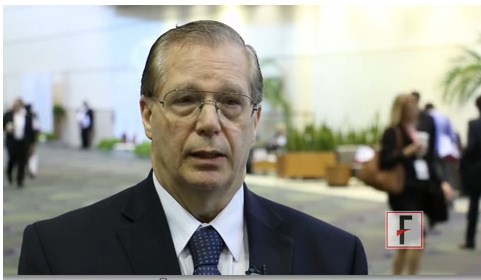User login
ORLANDO – Older patients with x-linked severe combined immunodeficiency syndrome (SCID-X1) treated initially with haploidentical stem cell transplantation without conditioning have impaired immunity and experience severe, life-long morbidities. Dr. Harry L. Malech, chief of the Laboratory of Host Defenses and Chief, Genetic Immunotherapy Section, U.S. National Institute of Allergy and Infectious Diseases, Bethesda, Md., discusses how investigators at the U.S. NAID are treating autologous CD34 cells from patients with SCID-X1 with a lentiviral vector that transduced the cells with normal copies of the gene which in its mutated form causes SCID-X1. In early trials, they have been able to significantly improve immune function in some patients without an apparent increase in risk for malignancies, a common problem with earlier gene therapies.
The video associated with this article is no longer available on this site. Please view all of our videos on the MDedge YouTube channel
ORLANDO – Older patients with x-linked severe combined immunodeficiency syndrome (SCID-X1) treated initially with haploidentical stem cell transplantation without conditioning have impaired immunity and experience severe, life-long morbidities. Dr. Harry L. Malech, chief of the Laboratory of Host Defenses and Chief, Genetic Immunotherapy Section, U.S. National Institute of Allergy and Infectious Diseases, Bethesda, Md., discusses how investigators at the U.S. NAID are treating autologous CD34 cells from patients with SCID-X1 with a lentiviral vector that transduced the cells with normal copies of the gene which in its mutated form causes SCID-X1. In early trials, they have been able to significantly improve immune function in some patients without an apparent increase in risk for malignancies, a common problem with earlier gene therapies.
The video associated with this article is no longer available on this site. Please view all of our videos on the MDedge YouTube channel
ORLANDO – Older patients with x-linked severe combined immunodeficiency syndrome (SCID-X1) treated initially with haploidentical stem cell transplantation without conditioning have impaired immunity and experience severe, life-long morbidities. Dr. Harry L. Malech, chief of the Laboratory of Host Defenses and Chief, Genetic Immunotherapy Section, U.S. National Institute of Allergy and Infectious Diseases, Bethesda, Md., discusses how investigators at the U.S. NAID are treating autologous CD34 cells from patients with SCID-X1 with a lentiviral vector that transduced the cells with normal copies of the gene which in its mutated form causes SCID-X1. In early trials, they have been able to significantly improve immune function in some patients without an apparent increase in risk for malignancies, a common problem with earlier gene therapies.
The video associated with this article is no longer available on this site. Please view all of our videos on the MDedge YouTube channel
AT ASH 2015
